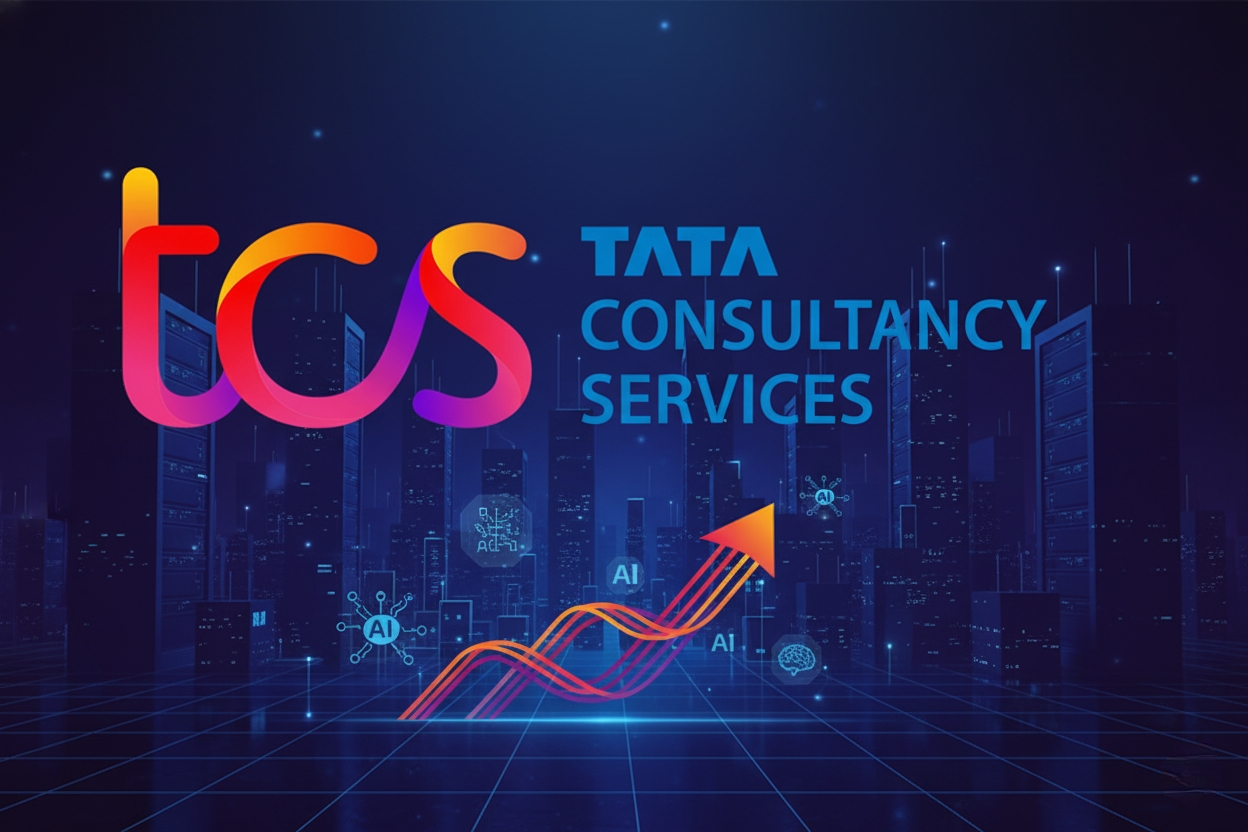Synopsis — TCS AI workforce 2025
TCS has doubled its AI-skilled workforce to 1.6 lakh employees in 2025, marking a major transformation in India’s IT sector. This expansion highlights how artificial intelligence is rapidly reshaping hiring, training, and the skill sets that will define tech careers in 2026 and beyond.
The AI Hiring Wave in October 2025
In October 2025, Tata Consultancy Services confirmed that it now employs 1.6 lakh professionals trained in AI and data science. The company added about 18,500 new AI-ready hires in Q2 FY 2025, reflecting how India’s largest IT exporter is preparing for an automation-driven future.
The chart below shows how TCS’s AI-skilled workforce has grown over the past year:

This shift goes beyond technology – it changes the kind of talent Indian IT companies need. Instead of focusing on routine coding or testing, TCS is building teams that can design, deploy, and manage AI-powered solutions for global clients.
Inside TCS’s AI Transformation
TCS has launched internal programs that train thousands of employees through its AI Bridge platform. These courses cover areas such as data engineering, generative AI, MLOps, and cloud AI.
Executives say the goal is to make every consultant “AI literate” by mid-2026 so that human expertise combines smoothly with machine intelligence. Clients in banking, healthcare, and retail increasingly want end-to-end automation, and TCS aims to deliver that through skilled teams rather than repetitive manual work.
The Broader Impact on Indian Tech Jobs
This development has a ripple effect across the IT industry.
- Infosys, Wipro, and Tech Mahindra are expanding their own AI upskilling programs.
- Traditional roles such as manual QA, data entry, and level-1 support are shrinking.
- New opportunities are appearing in AI operations, data visualization, and prompt design.
The shift is not about losing jobs; it is about transforming what each role requires. Professionals who learn how to use AI tools effectively are finding that their productivity and value rise.
For a broader comparison between India and the US, read our full report:
AI Job Risk 2025: India vs USA — Which Jobs Are Most at Risk?
Skills That Will Matter Most in 2026
As AI adoption deepens across India’s IT sector, a few technical and strategic skills are emerging as career differentiators.
The chart below shows which AI skills employers are prioritizing based on trends from the TCS AI workforce 2025 expansion.

These figures align closely with what TCS and other Indian IT firms are emphasizing in their AI upskilling programs. The table below breaks down why each of these skills matters and how professionals can apply them.
| Skill | Why It Matters |
| Prompt Engineering | Teaches people how to communicate with AI models clearly. |
| ML Ops & Deployment | Ensures that trained AI models run reliably in production. |
| Data Visualization (Power BI / Tableau) | Turns complex data into insights that guide decisions. |
| Python + LLM APIs | Key to connecting AI models with real applications. |
| AI Governance & Ethics | Vital for compliance and responsible automation. |
Even non-technical workers benefit from using AI tools for writing, analysis, or reports. Learning these skills makes employees adaptable as companies automate routine tasks.
Also read: Top 5 Future-Proof Skills to Learn in 2025 — to stay ahead of automation.
What Job Seekers and Graduates Should Do
For students and early-career professionals, the current trend is a career booster. TCS and other firms now expect basic understanding of Python, statistics, and cloud platforms, plus awareness of data ethics and privacy.
Colleges that integrate AI modules into engineering or management courses already see stronger placements. Graduates who can demonstrate applied projects, such as small LLM or data-analysis prototypes, gain a clear advantage.
If you’re wondering which jobs remain safest, check out:
Jobs AI Can’t Replace in India 2030: 10 Future-Proof Careers
India’s AI Ecosystem Is Expanding Fast
Government programs like the Digital India AI Mission (2025) and NASSCOM’s AI Talent Accelerator are creating large pools of skilled workers. Startups in fintech, health tech, and logistics are hiring AI product managers and data ops engineers.
Analysts estimate India will have two million AI-skilled professionals by 2027. The next year will likely mark a shift from experimentation to large-scale adoption across industries.
Balancing Automation and Human Skills
While automation reduces repetitive work, human judgment and creativity remain essential. TCS’s approach keeps a “human-in-the-loop” model, where people guide and verify AI outputs.
This model means employees move from performing manual tasks to supervising intelligent systems. Those who adapt early will find new career stability, while resisting change could make skills outdated quickly.
Conclusion — A Clear Signal for 2026
TCS’s expansion of its AI workforce is more than company news, it is a clear signal about the future of Indian IT jobs. The market is shifting toward automation, but the opportunities are expanding for anyone ready to learn.
Whether you are in software, data, or business analysis, adopting AI tools now can secure your place in tomorrow’s workforce. The companies leading this change, starting with TCS, are shaping what success in India’s tech industry will look like in 2026 and beyond.
More from AIJobRisk:
- Will AI Replace Data Entry Jobs? (2025–2035 Outlook)
- Campus Placements 2025 in India: AI’s Impact on Salaries & Skills
References
- Tata Consultancy Services (TCS) Newsroom. TCS Q2 FY2026 Results and AI Workforce Expansion, October 2025. https://www.tcs.com/who-we-are/newsroom/press-release/tcs-financial-results-q2-fy-2026
- The Economic Times. TCS Doubles AI-Skilled Workforce as Indian IT Firms Accelerate Generative AI Hiring, October 2025. https://m.economictimes.com/…/articleshow/124453937.cms
- TCS Report – AI for Business Study. Details TCS’s AI strategies and internal training programs. https://www.tcs.com/…/Report-TCS-AI-for-Business-Study.pdf
- NASSCOM. AI Adoption and Talent in India 2024, NASSCOM Portal. https://nasscom.in/…/ai-adoption-index-20-tracking-indias-sectoral-progress-ai-adoption
- MeitY (Government of India). Digital India AI Mission 2025, Ministry of Electronics & IT. https://www.meity.gov.in/
FAQs
Q1. How many AI-trained employees does TCS have in 2025?
TCS announced 1.6 lakh AI-skilled employees in October 2025, roughly double the number from the previous year.
Q2. Which AI skills are most in demand at TCS and other IT firms?
Key areas include data engineering, MLOps, prompt design, Python with LLM APIs, and AI governance.
Q3. How can Indian tech professionals prepare for TCS-style AI hiring?
Focus on learning data engineering, Python + LLM APIs, and AI ethics through certified online programs like Coursera or Microsoft Learn.

